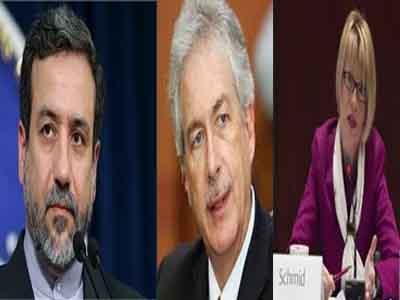ID :
334428
Sun, 07/06/2014 - 09:01
Auther :
Shortlink :
https://oananews.org//node/334428
The shortlink copeid
Burns Joins Araqchi-Schmid Talks To Draft Final Nuclear Deal

Vienna, July 6, IRNA – US Deputy Secretary of State William Burns joined consultations between Iranian Deputy Foreign Minister Abbas Araqchi and EU Deputy Foreign Policy Director Helga Schmid here Saturday to draft a final nuclear agreement between Iran and Western sextet.
Tough and intensive consultations aimed at facilitating the drafting of the text of a final agreement on Iranˈs nuclear program between our country and the six world powers which began on Firiday afternoon have thus far continued for almost 16 hours.
The 6th round of nuclear negotiations between Iran and the 5+1 Group (France, Britain, Russia, China, the United States and Germany), called the Vienna 6 talks began in the Austrian capital city on Wednesday, July 2 and will continue till Sunday, July 20, the deadline of Iranˈs Geneva Agreement with the six world powers.
The analysts have opined that the talks could ˈpotentiallyˈ last until July 20 when an interim deal from November expires, although this could be extended by up to six months, which means they could also end sooner than that either due to a faster reached agreement, or due to reaching a serious roadblock.
US Secretary of State John Kerry, in the Washington Post, said that the negotiations on what would be a fiendishly complex deal constituted “a choice for Iranˈs leaders”.
“They can agree to the steps necessary to assure the world that their countryˈs nuclear program will be exclusively peaceful... Or they can squander a historic opportunity”, Kerry wrote.
British Foreign Secretary William Hague said that with differences “significant”, a deal was “far from certain”. Iran needs to be “realistic” about the steps it needs to take, he said.
But Iranian Foreign Minister Mohammad Javad Zarif, writing in French daily Le Monde, said that some among the P5+1 were suffering from “illusions” about Iranˈs nuclear program.
He said that contrary to fears in the West, Iran - even if it wanted to - is “several years and not a few months” away from being able to build an atomic bomb.
Demands that Iranˈs program be “radically curbed” rest on a “gross misrepresentation of the steps, time and dangers of a dash for the bomb”, Zarif said.
“We are willing to provide assurances of the exclusively peaceful nature of our nuclear program. But we will not abandon or make a mockery of our technological advances or our scientists,” he said.
In a video message Zarif said the talks represented a “unique opportunity to make history”.
“We are trying to reach a deal,” he added. “Not a good deal or a bad deal, but a doable and lasting deal.”
Iranian nuclear negotiator Majid Takhte Ravanchi told the Iranian Students News Agency (ISNA) that Iran has set out clear “red lines”.
“The other side knows that these red lines cannot be crossed. If we reach a deal it will be one respecting these red lines. If not there will be no accord,” he said.
One such position is thought to be on the key central issue of enrichment, the process rendering uranium suitable for power generation.
French Foreign Minister Laurent Fabius said last month Iran has to slash the number of centrifuge enrichment machines to several hundred from the almost 20,000 at present.
“We will not accept definitive restrictions” on our nuclear program, Ravanchi said.
But Kelsey Davenport, Arms Control Association analyst, was upbeat, saying there is “considerable political will” for a deal since it is in the interests of both sides.
“There is a lot of time left for diplomacy and a good comprehensive nuclear agreement is within reach, despite significant gaps between the two sides on core issues,” she told AFP./end





